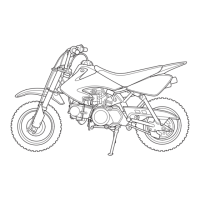BATTERY/CHARGING SYSTEM
19-5
TROUBLESHOOTING
BATTERY IS DAMAGED OR WEAK
1. BATTERY TEST
Remove the battery (page 19-6).
Check the battery condition using the recommended battery tester.
Is the battery in good condition?
YES – GO TO STEP 2.
NO – Faulty battery.
2. CURRENT LEAKAGE TEST
Install the battery (page 19-6).
Check the battery current leakage (Leak test; page 19-7).
Is the current leakage below 1.5 mA?
YES – GO TO STEP 4.
NO – GO TO STEP 3.
3. CURRENT LEAKAGE TEST WITHOUT REGULATOR/RECTIFIER
Disconnect the regulator/rectifier 5P connector and recheck the battery current leakage.
Is the current leakage below 1.5 mA?
YES – Faulty regulator/rectifier.
NO – • Shorted wire harness.
• Faulty ignition switch.
4. CHARGING VOLTAGE INSPECTION
Measure and record the battery voltage using a digital multimeter (page 19-7).
Start the engine.
Measure the charging voltage.
Compare the measurement to result of the following calculation.
• BV = Battery Voltage
• CV = Charging Voltage
Is the measured charging voltage within the standard voltage?
YES – Faulty battery.
NO – GO TO STEP 5.
5. ALTERNATOR CHARGING COIL INSPECTION
Check the alternator charging coil (page 19-8).
Is the alternator charging coil resistance within 0.1 – 1.0 Ω (20°C/68°F)
YES – GO TO STEP 6.
NO – Faulty charging coil.
6. REGULATOR/RECTIFIER SYSTEM INSPECTION
Check the voltage and resistance at the regulator/rectifier connector (page 19-8).
Are the results of checked voltage and resistance correct?
YES – Faulty regulator/rectifier.
NO – • Open circuit in related wire.
• Loose or poor contacts of related terminal.
• Shorted wire harness.
RECOMMENDED BATTERY TESTER:
BM210 or BATTERY MATE or equivalent
STANDARD: Measured BV < Measured CV < 15.5 V

